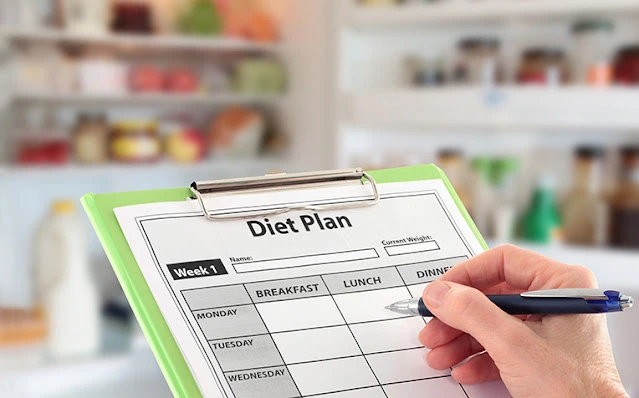Losing weight can be a challenging and overwhelming task for many people. While exercise is essential for overall health, it is not the only way to lose weight. Diet plays a crucial role in weight loss and can be the most effective way to shed those extra pounds.
Unfortunately, many believe they need to exercise excessively to see results, leading to frustration and giving up on their weight loss goals. This blog post will discuss how optimizing your diet can help you lose weight without exercise.
The importance of diet in weight loss
Regarding weight loss, the number of calories consumed vs. the number of calories burned matters. By consuming fewer calories than you burn, your body will tap into its stored fat for energy, and you’ll lose weight.
While exercise can help burn calories, it’s only sometimes necessary if you’re in a calorie deficit. Eating a healthy, balanced diet is one of the most critical steps in achieving this deficit.
The misconception that exercise is the only way to lose weight:
Exercise is essential to a healthy lifestyle, but it’s not the only way to lose weight. Many believe they have to exercise for hours every day to see results, but that’s not the case. You can lose weight without exercise by focusing on your diet and making healthy choices.
It’s important to note that exercise is still essential for overall health and fitness, but diet plays a much more significant role in weight loss. You can sustainably achieve your weight loss goals by focusing on exercise and diet.
Weight loss is not just about exercise. A balanced diet plays a crucial role in helping you lose weight. By focusing on your diet and making healthy choices, you can lose weight without exercise.
Understanding the Role of Calories in Weight Loss:
Calories are units of energy that our bodies use to function. They are found in the food and drinks we consume and are necessary for our bodies to carry out everyday activities such as breathing, moving, and thinking. However, when we consume more calories than our body needs, it can lead to weight gain.
What are calories?
Calories are a unit of measure used to quantify the energy content of food and drink. Our bodies need a certain number of calories each day to function correctly. The number of calories necessary varies depending on age, gender, weight, and activity level.
How many calories should be consumed daily?
The number of calories needed each day can vary depending on individual factors. Generally, men require more calories than women, and active individuals need more calories than sedentary ones. A passive woman needs about 2000 calories per day, while a passive man needs about 2500 calories.
However, it’s always best to consult a dietician or nutritionist to determine the number of calories that’s right for you.
How calories affect weight loss
Regarding weight loss, the number of calories consumed vs. the number of calories burned matters. Consuming more calories than your body burns will lead to weight gain while consuming fewer calories than you burn will lead to weight loss.
To lose weight, you’ll need to create a calorie deficit. One way to do this is to reduce your calorie intake by eating smaller portions or cutting back on high-calorie foods. Another way is to increase the number of calories burned through exercise.
Understanding the role of calories in weight loss is essential for achieving your weight loss goals. By consuming the right amount of calories for your body and creating a calorie deficit through reducing calorie intake or increasing exercise, you can sustainably lose weight.
Always consult with a dietician or nutritionist before making any drastic changes in your diet.
Choosing the Right Foods for Weight Loss
When it comes to weight loss, not all foods are created equal. Some foods can help you lose weight, while others can sabotage your efforts. One of the keys to successful weight loss is choosing the right foods to include in your diet.
In this section, we will discuss the importance of protein, the role of carbohydrates and fats, the benefits of fiber, and how to read food labels.
The importance of protein
Protein is essential for weight loss. It helps keep you full, reduce your appetite, and preserve muscle mass while losing weight. Protein-rich foods include lean meats, fish, eggs, and dairy products.
When planning your meals, make sure to have a source of protein at every meal and snack.
The role of carbohydrates and fats
Carbohydrates and fats are also essential for a healthy diet, but when it comes to weight loss, the type and quantity of each macronutrient are crucial. Choosing suitable kinds of carbohydrates and fats is vital.
Complex carbohydrates such as whole grains, fruits and vegetables, and legumes are healthier options than simple carbohydrates found in refined sugars.
Similarly, monounsaturated and polyunsaturated fats are better options than saturated and trans fats.
The benefits of fiber
Fiber is another essential nutrient for weight loss. It helps to keep you feeling full, control blood sugar levels, and promote regular bowel movements. Foods high in fiber include fruits, vegetables, whole grains, and legumes. Include at least 25 grams of fiber in your diet daily.
How to read food labels
Reading food labels can be helpful when trying to make healthy food choices. Look for foods low in calories, saturated fat, trans fat, and added sugars.
The food label will also give you information about the serving size, so you can be sure you’re consuming the right amount. When in doubt, stick to whole, unprocessed foods, such as fruits, vegetables, lean protein, and whole grains.
Choosing the right foods can significantly impact your weight loss journey. Incorporating protein, complex carbohydrates, healthy fats, and fiber into your diet can help you feel full, control blood sugar levels, and promote weight loss.
Make sure also to read food labels and choose whole, unprocessed foods. By making the right food choices, you’ll be well on achieving your weight loss goals.
Meal Planning for Weight Loss
Meal planning is an essential part of weight loss. It helps you stay on track with your diet and keep your calorie intake in check. This section will discuss the importance of portion control, the benefits of meal prepping, and healthy meal ideas for breakfast, lunch, and dinner.
The importance of portion control
Portion control is essential for weight loss. Eating more than you need can be easy, especially when eating out or consuming high-calorie foods. By measuring or estimating your portions, you can ensure that you’re consuming the right amount of calories. Smaller plates, measuring cups, and food scales can help you control your legs.
The benefits of meal prepping.
Meal prepping is another essential aspect of weight loss. It allows you to plan and prepare your meals in advance, making it easy to stay on track with your diet. Meal prepping can also help you save time and money and reduce the temptation to eat unhealthy foods.
When you have prepared healthy meals, it’s easier to make healthier choices throughout the day.
Healthy meal ideas for breakfast, lunch, and dinner
Here are some healthy meal ideas for breakfast, lunch, and dinner that can be easily prepped in advance:
- Breakfast: Overnight oats with Greek yogurt, berries, and chopped nuts.
- Lunch: Grilled chicken breast with quinoa, roasted vegetables, and avocado.
- Dinner: Baked salmon with sweet potato wedges and steamed broccoli.
Meal planning is an essential part of weight loss. You can maintain a calorie deficit and achieve your weight loss goals by controlling portions, prepping, and having a list of healthy meal options.
Meal planning and prepping can also save time and money and reduce the temptation to eat unhealthy foods. Remember, small and consistent efforts yield significant results over time.
Staying Motivated and Making it a Lifestyle
Losing weight and achieving your goals can be challenging, and staying motivated is essential throughout the journey.
This section will discuss setting realistic weight loss goals, consistency, staying motivated, and making healthy eating a sustainable lifestyle.
How to set realistic weight loss goals
Setting realistic weight loss goals is essential to staying motivated. When your goals are too ambitious, it can be easy to become discouraged and give up.
Start by setting small, achievable goals and gradually increase them as you progress. Setting both short-term and long-term goals is critical so that you have something to strive for.
The importance of consistency
Consistency is vital when it comes to weight loss. It’s easy to get motivated initially, but staying committed to your goals is what counts.
Try to make healthy eating and exercise a part of your daily routine and stick with it even when things get tough.
How to stay motivated
Staying motivated can be challenging, but a few things can help. Try to focus on the benefits of your new lifestyle and how it makes you feel.
Also, tracking your progress, having a support system, and rewarding yourself can help you stay motivated.
How to make healthy eating a sustainable lifestyle
Healthy eating and a sustainable lifestyle require more than a strict diet plan. It is about making changes that can be sustained over time. Focus on one change at a time, such as adding more fruits and vegetables to your diet or cooking more meals at home.
Also, don’t be too hard on yourself. Allow yourself to indulge in the occasional treat.
Staying motivated and making healthy eating a lifestyle is an essential part of weight loss. By setting realistic goals, being consistent, staying motivated, and making gradual changes, you can achieve your weight loss goals and make healthy eating a sustainable lifestyle.
Remember, progress takes time, and every small step counts.
Conclusion
Losing weight can be challenging, but it can be achieved with the right approach. In this blog post, we discussed the importance of diet in weight loss, the misconceptions that exercise is the only way to lose weight, understanding the role of calories, choosing the right foods, meal planning, staying motivated, and making it a lifestyle.
It’s important to note that while exercise is essential for overall health, it’s not the only way to lose weight. By optimizing your diet, you can achieve weight loss without exercise.
By consuming the right calories and making healthy food choices, you can create a calorie deficit and lose weight.
Making healthy choices can be challenging, especially when starting, but small steps and consistent effort can yield significant results. Start by making small changes and gradually increase them over time.
Remember, healthy eating and weight loss are a journey, and being kind to yourself is essential. So, take the first step today, and start making healthy choices.












